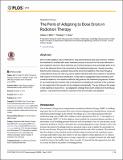The Perils of Adapting to Dose Errors in Radiation Therapy
Author(s)
Chan, Timothy C. Y.; Misic, Velibor
DownloadMisic-2015-The perils of adapti.pdf (694.6Kb)
PUBLISHER_POLICY
Publisher Policy
Article is made available in accordance with the publisher's policy and may be subject to US copyright law. Please refer to the publisher's site for terms of use.
Terms of use
Metadata
Show full item recordAbstract
We consider adaptive robust methods for lung cancer that are also dose-reactive, wherein the treatment is modified after each treatment session to account for the dose delivered in prior treatment sessions. Such methods are of interest because they potentially allow for errors in the delivered dose to be corrected as the treatment progresses, thereby ensuring that the tumor receives a sufficient dose at the end of the treatment. We show through a computational study with real lung cancer patient data that while dose reaction is beneficial with respect to the final dose distribution, it may lead to exaggerated daily underdose and overdose relative to non-reactive methods that grows as the treatment progresses. However, by combining dose reaction with a mechanism for updating an estimate of the uncertainty, the magnitude of this growth can be mitigated substantially. The key finding of this paper is that reacting to dose errors – an adaptation strategy that is both simple and intuitively appealing – may backfire and lead to treatments that are clinically unacceptable.
Date issued
2015-05Department
Massachusetts Institute of Technology. Operations Research Center; Sloan School of ManagementJournal
PLOS ONE
Publisher
Public Library of Science
Citation
Misic, Velibor V., and Timothy C. Y. Chan. “The Perils of Adapting to Dose Errors in Radiation Therapy.” Edited by Qinghui Zhang. PLOS ONE 10, no. 5 (May 5, 2015): e0125335.
Version: Final published version
ISSN
1932-6203